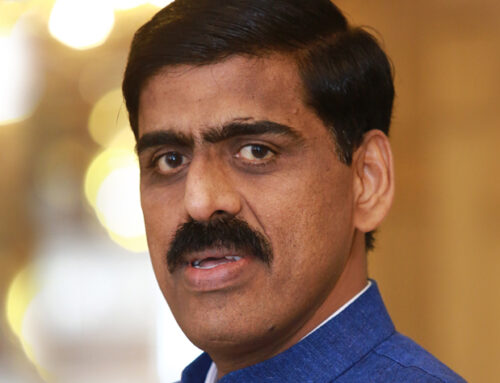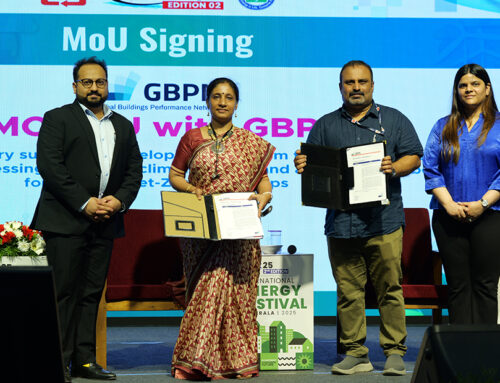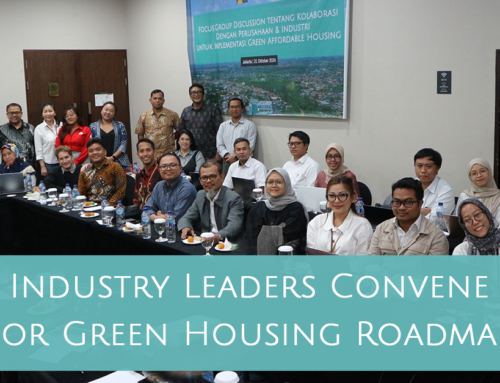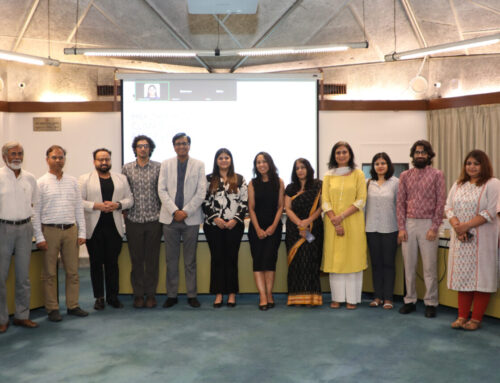GBPN has signed a new MoU in India that aims to have a positive impact on the environment and help residents live healthier lives. The MoU was signed with the Lodha Group – one of the largest real estate developers in India. In partnership with Ashok B Lall Architects (ABLA), GBPN is supporting the developer to design and develop low carbon, healthy buildings in the Mumbai region.
Lodha Group has a multinational presence and constructs both residential and commercial buildings. The developer has a stated vision of being carbon neutral by 2035.  According to Gautam Nagar, GBPN Senior Advisor India, decarbonising the building sector needs strong participation from the private sector.
According to Gautam Nagar, GBPN Senior Advisor India, decarbonising the building sector needs strong participation from the private sector.
“Government regulations are essential to encourage energy efficient buildings, but effective and widespread implementation needs participation from developers and builders,” Mr Nagar said.
“Under this MoU, GBPN will support the Lodha Group in designing and developing low carbon, healthy and affordable homes.”
GBPN will provide passive design recommendations to improve thermal comfort sustainably. Passive design works with the local climate to incorporate features into the building design that maintain a comfortable temperature in the home. It considers elements such as window placement, air flow, insulation and building materials as ways to inherently reduce heat without the need for air conditioning or other artificial cooling.
The collaboration will also focus on improving overall safety and security for women, children and elderly people, both in terms of physical safety and healthy living.
Practical recommendations for healthy, sustainable buildings
GBPN is working on the development of design charrettes with its partner, ABLA, to provide practical support to builders, showing them how to make their designs more sustainable through passive design features. This approach has been proven to effectively engage developers with more sustainable building practices. As part of this process, Lodha Group is aiming to explore the recommendations of the design charrettes. It will pilot practical, low-cost passive design recommendations before rolling out successful approaches across all developments.
passive design features. This approach has been proven to effectively engage developers with more sustainable building practices. As part of this process, Lodha Group is aiming to explore the recommendations of the design charrettes. It will pilot practical, low-cost passive design recommendations before rolling out successful approaches across all developments.
Ashok B Lall, principal architect at ABLA, highlighted that increasing pollution as a result of the rapid urbanisation in India is putting vulnerable people at risk.
“Vulnerable people like women and children, and people with disabilities, are the worst affected by unhealthy and highly polluting buildings. Buildings must adopt low-energy and carbon-neutral technologies to mitigate the effects of urbanisation and climate change,” Mr Lall said.
“The design charrettes were developed with emphasis on the thermal comfort and physical and health safety of these vulnerable groups.”
Sustainable Buildings, Healthy Buildings
GBPN is part of the global Crux Alliance, working to design and implement smart climate policies around the world. The MoU with the Lodha Group is part of the CRUX-funded Healthy Buildings project, which aims to promote development and adoption of healthy, affordable buildings in India.
 The project looked at potential innovations in sustainable home design that are both healthy and affordable. One of the main obstacles was convincing developers to understand that eco-friendly building practices don’t have to be more expensive than conventional methods, according to Maaz Dixit, Project Consultant, GBPN India.
The project looked at potential innovations in sustainable home design that are both healthy and affordable. One of the main obstacles was convincing developers to understand that eco-friendly building practices don’t have to be more expensive than conventional methods, according to Maaz Dixit, Project Consultant, GBPN India.
“We wanted developers to recognize that sustainability can be attained without increasing costs compared with conventional practices,” Ms Dixit said.
“Numerous adjustments at the design stage, such as better insulation or ventilation systems, allow for buildings to become more economical yet low-carbon.”
GBPN will continue to engage with developers and other private sector stakeholders to provide support for designing and developing sustainable, healthy and affordable homes in India.
Share This Story, Choose Your Platform!
Stay in touch with how we’re transforming the buildings sector
GBPN runs innovative building policy reform programs in key regions around the world that aim to tackle the climate emergency by decarbonising the buildings sector. Stay up to date with our newsletter.
Stay in touch with how we’re transforming the buildings sector
GBPN runs innovative building policy reform programs in key regions around the world that aim to tackle the climate emergency by decarbonising the buildings sector. Stay up to date with our newsletter.







